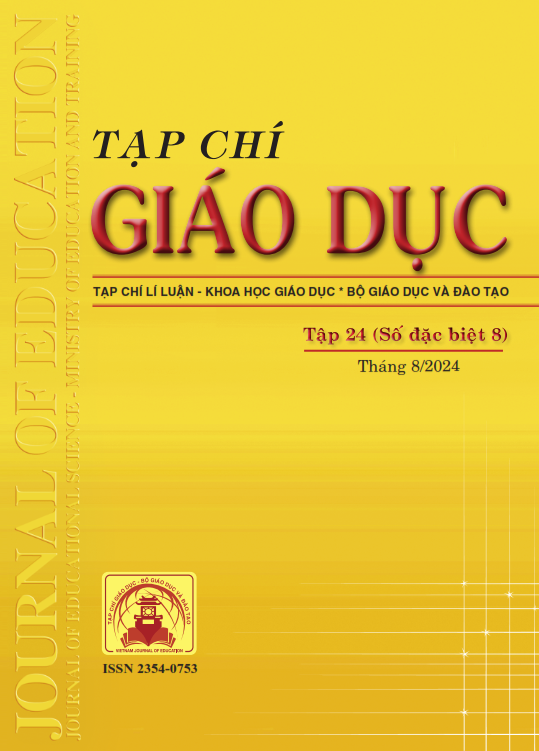Đề xuất mô hình ứng dụng công nghệ thông tin trong kiểm tra, đánh giá theo định hướng giáo dục thông minh
Tóm tắt
This research proposes a model for the application of information technology in testing and assessment according to smart education (SE) orientation. Through an analysis of the role and limitations of traditional assessment methods, the research highlights the necessity of innovating assessment forms in line with SE trends. The innovation orientation aims to establish an implementation process supported by technologies. The process includes: Collecting student data, building a question and test bank, organizing online assessments, grading and analyzing test results, providing feedback and adjusting teaching activities. The proposed technologies for implementation include artificial intelligence (AI), online testing software, and big data analytics tools. These tools are integrated according to their respective functions within the proposed assessment process. If the established criteria and requirements are met, the implementation of this model will enhance the objectivity, accuracy, and effectiveness of testing and assessments, as well as promote educational innovation towards the SE trend. The research recommends specific solutions for scaling up the model to a wider scope.
Tài liệu tham khảo
Cổ Tồn Minh Đăng (2023). Đặc điểm và một số mô hình dạy học theo định hướng giáo dục thông minh. Tạp chí Khoa học Giáo dục Việt Nam, 19(5), 7-11. https://doi.org/10.15625/2615-8957/12310502
Cổ Tồn Minh Đăng, Trần Thị Tâm Minh (2023). Quản lí dạy học theo định hướng giáo dục thông minh: một số vấn đề cần lưu ý. Tạp chí Quản lí Giáo dục, 15(11), 17-22. https://doi.org/10.53750/jem23.v15.n11.17
Demir, K. A. (2021). Smart education framework. Smart Learning Environments, 8(1). https://doi.org/10.1186/ s40561-021-00170-x
Diaz-Parra, O., Fuentes-Penna, A., Barrera-Camara, R. A., Trejo-Macotela, F. R., Ramos-Fernandez, J. C., Ruiz-Vanoye, J. A., Ochoa Zezzatti, A., & Rodriguez-Flores, J. (2022). Smart Education and future trends. International Journal of Combinatorial Optimization Problems and Informatics, 13(1), 65-74.
Dương Thiệu Tống (2005). Trắc nghiệm và đo lường thành quả học tập (phương pháp thực hành). NXB Khoa học xã hội.
Embarak, O. H., & Hawarna, S. (2023). Smart Education for Industry 4.0 Sustainable Futures: A New Theory of Maximization for Learner Success. International Journal of Information and Education Technology, 13(11), 1704-1712. https://doi.org/10.18178/ijiet.2023.13.11.1979
Hoàng Đức Nhuận, Lê Đức Phúc (2008). Cơ sở lí luận của việc đánh giá chất lượng học tập của học sinh phổ thông (Chương trình khoa học cấp nhà nước KX-07-08).
Noh, K.-S., Ju, S., & Jung, J.-T. (2011). An Exploratory Study on Concept and Realization Conditions of Smart Learning. Journal of Digital Convergence, 9, 79-88.
Sharonova, S., & Avdeeva, E. (2024). Smart Education: Social Risks and Challenges. In EAI/Springer Innovations in Communication and Computing: Vol. Part F2195 (pp. 99-118). Springer Science and Business Media Deutschland GmbH. https://doi.org/10.1007/978-3-031-50139-5_5
Trần Khánh Đức (chủ biên, 2022). Khoa học tư duy và phát triển năng lực tư duy khoa học trong giáo dục và đào tạo. NXB Đại học Quốc gia Hà Nội.
UNESCO IITE (2022a). Analytical Report on the Global Innovations and Monitoring of the Status of Smart education. UNESCO IITE. http://creativecommons.org/licenses/by-sa/3.0/igo/
UNESCO IITE (2022b). Smart Education Strategies for Teaching and Learning: Critical analytical framework and case studies. UNESCO IITE.
Zhu, Z. T., Sun, Y., & Riezebos, P. (2016). Introducing the smart education framework: Core elements for successful learning in a digital world. International Journal of Smart Technology and Learning, 1(1), 53-66. https://doi.org/10.1504/IJSMARTTL.2016.078159
Zhu, Z. T., Yu, M. H., & Riezebos, P. (2016). A research framework of smart education. Smart Learning Environments, 3. https://doi.org/10.1186/s40561-016-0026-2
Đã Xuất bản
Cách trích dẫn
Số
Chuyên mục
Giấy phép

Tác phẩm này được cấp phép theo Ghi nhận tác giả của Creative Commons Giấy phép quốc tế 4.0 .












